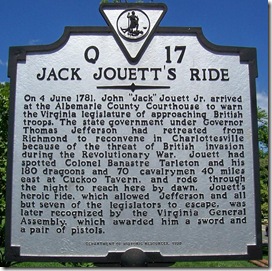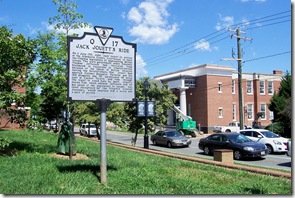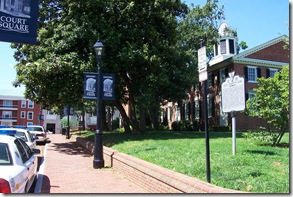 Charlottesville, VA
Charlottesville, VA
Marker No. Q-17
Marker Text: On 4 June 1781, John "Jack" Jouett Jr. arrived at the Albemarle County Courthouse to warn the Virginia legislature of approaching British troops. The state government under Governor Thomas Jefferson had retreated from Richmond to reconvene in Charlottesville because of the threat of British invasion during the Revolutionary War. Jouett had spotted Colonel Banastre Tarleton and his 180 dragoons and 70 cavalrymen 40 miles east at Cuckoo Tavern, and rode through the night to reach here by dawn. Jouett's heroic ride, which allowed Jefferson and all but seven of the legislators to escape, was later recognized by the Virginia General Assembly, which awarded him a sword and a pair of pistols.
Location: At the corner of High and Park Streets, Courthouse Square at rear of the Albemarle County Courthouse. Erected by the Department of Historic Resources in 1998.
 Photo taken with High Street in the background. Marker on northeast corner of the courthouse square. Click any photo to enlarge.
Photo taken with High Street in the background. Marker on northeast corner of the courthouse square. Click any photo to enlarge.
We continue our series of markers about Jack Jouett's ride from Cuckoo to Charlottesville with the marker indicating his arrival in Charlottesville and this marker is located in the Albemarle County Courthouse square.
Upon reaching Thomas Jefferson's home at Monticello about 4:30 a.m. on June 4, 1781, Jouett proceeded at once to rouse the sleeping occupants. Among them, besides Jefferson, were the Speakers and other members of the two houses of the General Assembly. Jefferson not only thanked Jouett for his timely warning: but is understood to have tendered a bracing glass or two of his best Madeira. Refreshed, the rider mounted his horse and rode the remaining two miles to Charlottesville, where he awakened dozens more of Virginia's legislators, many at Swan's Tavern which once stood just about 150 feet south and across the street from this marker and was owned by Jack Jouett's father.
Jefferson apparently took Jouett's warning seriously, but thought he had ample time to get away. Jefferson enjoyed breakfast along with other legislators staying at Monticello, then his guests joined their colleagues in town. Jefferson sent his family to safety at Enniscorthy Plantation fourteen miles away, via Blenheim, the Carter estate. He then spent nearly two hours securing and sorting his important state papers for packing or destruction. Technically, Jefferson was no longer Virginia's governor, his term had expired June 2. The government, however, would not appoint his replacement, General Nelson, until the fifth, and Nelson would not take office until the twelfth.
Albemarle Co. Courthouse is behind the marker.
In Charlottesville, upon getting the warning from Jouett that the British were coming, the General Assembly was hurriedly making plans for their departure. The members decided quickly that 40 should constitute a quorum and they adjourned to meet in Staunton three days later. Tarleton was so close on their heels that although Patrick Henry, Richard Henry Lee, Benjamin Harrison, Thomas Nelson, Jr., and numerous others got away, seven assemblymen were captured. Among the legislators, that Tarleton captured that day was frontiersman Daniel Boone. He detained them briefly, and paroled them.
Suddenly, Captain Christopher Hudson on route to join Lafayette’s forces, arrived at a gallop to say that British troopers were ascending the mountain to Monticello. Instantly Jefferson leaped upon his horse and plunged into the woods. The British were already at Monticello and Jefferson made the narrowest sort of escape. He eluded Tarleton’s men, and joined his family later in the day for dinner at Blenheim. How close was his escape? Henry Randall, in his book, “The Life Of Thomas Jefferson”, reported that while Jefferson was on the lawn of Monticello, Captain of Dragoons McLeon was actually in the house.
Photo taken looking up Park Street, Monticello marker is on the opposite corner and the former location of the Swan Tavern is across the street to the left.
The British did comparatively little damage. Monticello was unharmed, though some wine disappeared. Tarleton left Charlottesville on June 5. With his departure, the British considered the matter closed. Cornwallis wandered to Yorktown, where General George Washington trapped his army later in October and forced its surrender.
Thomas Jefferson’s political opponents inside and outside the state tried to make it appear that he had behaved in a cowardly fashion at the time of Tarleton’s raid. For many years thereafter his perennial enemies, the Federalists, sought to picture him as having fled dishonorably before the British. Tarleton himself wrote that Jefferson “provided for his personal safety with a precipitate retreat.”
Old Swan Tavern was located where building in the middle of the photo behind the tree. Courthouse to the left.
If anything, Jefferson waited too long at Monticello after being warned by Jouett, with the result that he barely escaped capture. Certainly he is no more to be criticized than the other the legislators, who beat a more “precipitate retreat” than he. The Virginia's legislative's escape from Charlottesville was the only logical and reasonable decision.
What would have been the fate of such men as Jefferson, Henry, Harrison, Nelson, and Lee, if they had fallen into British hands? They would almost certainly have been carried off into captivity by Tarleton and with such a prize he would not have paroled them as he had done with other less significant legislators. Their capture would have been a serious blow to the morale of the Continentals, especially at a time when things were going rather badly for their cause. Most likely, Tarleton would have taken them back to Cornwallis who would have publicly hang them, in order, to end the American Revolution.
Stuart G. Gibbony, President of the Thomas Jefferson Memorial Foundation said of Jack Jouett in 1926: "But for Captain Jack Jouett's heroic ride, there would have been no Yorktown and the Revolutionists would have been only unsuccessful rebels."



This is a really cool website to learn things on. It can help many students like me and other kids too. Please post more information though. It would make it more helpful!
ReplyDeleteThank you for your kind comment. I am still out taking photos of markers, but due to my full-time job and other blogs I contribute to related to my work, I don't get the time to post here very often. I am working toward regularly post here once I retire.
Delete